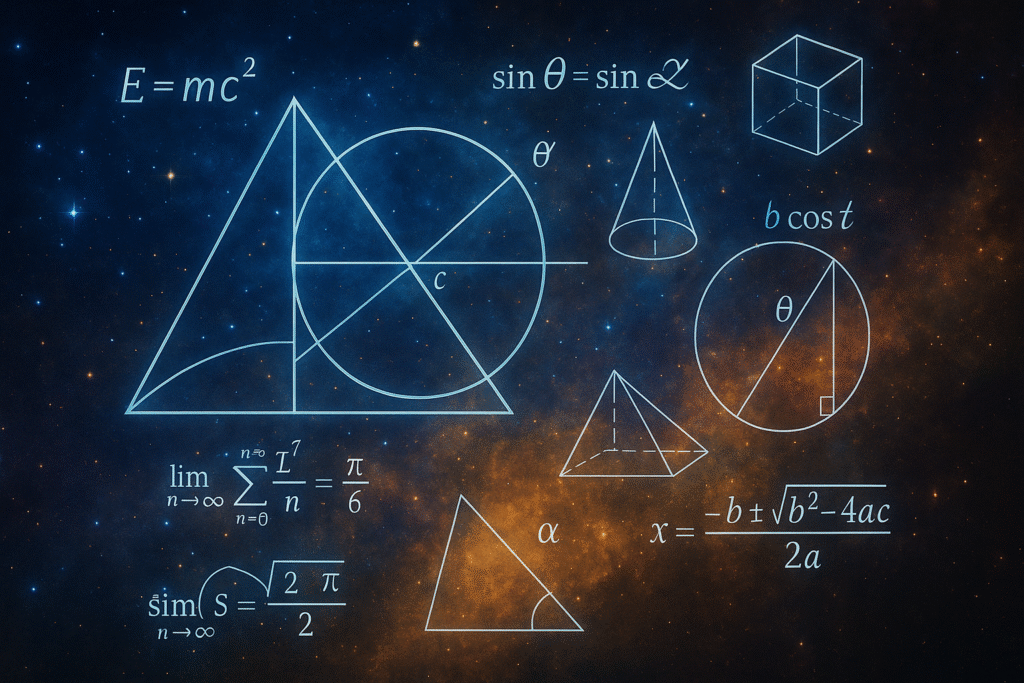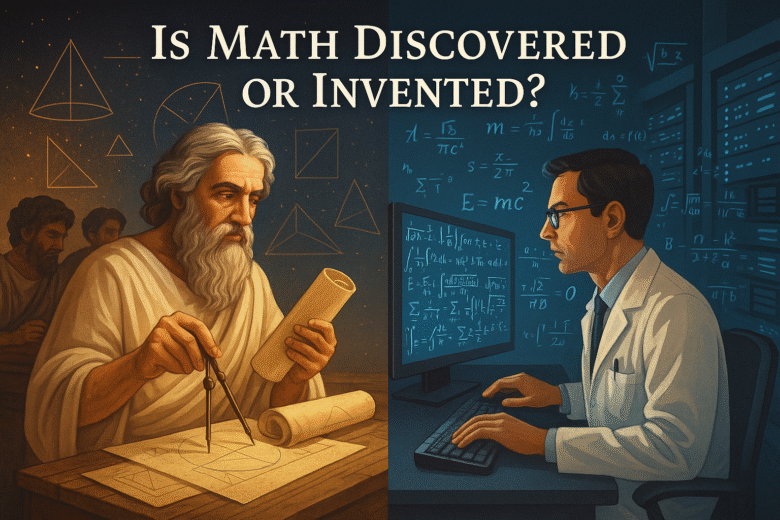Fun fact: The ancient Babylonians calculated the value of π (pi) to four decimal places—without calculators, electricity, or even the number zero.
Is mathematics something we find out there in the universe, like explorers stumbling upon a hidden island? Or is it something we make up, a clever set of rules humans invented to make sense of the world?
This is the age-old debate at the heart of the question: Is math discovered or invented? At first glance, it might seem like a conversation best left to philosophers and professors with too much time on their hands. But this debate is far more personal than you think—it’s really about how we see truth, knowledge, and even ourselves.
The Two Camps: Platonists vs. Nominalists
Broadly speaking, the math debate has two main schools of thought.
Platonists (named after the philosopher Plato) believe math exists independently of humans. According to them, numbers, shapes, and equations have an existence of their own—floating somewhere in the abstract realm of truth, just waiting for us to discover them. Under this view, Einstein didn’t invent relativity—he merely revealed it, like dusting off a statue that was always there.
Nominalists (and other anti-realist thinkers) argue the opposite: math is a human invention, just like chess or the rules of cricket. We created symbols, definitions, and systems to describe patterns we observe in the world. Under this view, Pythagoras didn’t discover a universal truth—he built a mental tool that happened to work very well for building temples and pyramids.
The Universe Doesn’t Use Calculators
Here’s the tricky part—nature itself doesn’t “know” math. Apples don’t count themselves. Planets don’t calculate their orbits. Rainbows don’t measure their own arcs.
When Newton described gravity with equations, he wasn’t uncovering the universe’s language; he was translating natural phenomena into our language. Think about it: gravity would still work perfectly fine even if no human existed to give it a mathematical formula.
Yet—how is it that those formulas, invented in our minds, can so precisely predict the motion of planets, the path of light, and the behaviour of subatomic particles?
The Unreasonable Effectiveness of Mathematics
Physicist Eugene Wigner famously called it “the unreasonable effectiveness of mathematics.” That is, math works too well to be just a random invention.
Take the example of black holes. Mathematicians predicted their existence through Einstein’s equations decades before telescopes could detect them. Or consider the Higgs boson particle—mathematically theorized in the 1960s, but not confirmed experimentally until 2012 at CERN (the European Organization for Nuclear Research).
These cases make it hard to dismiss math as just a human-made system. How could a mere invention so accurately describe phenomena we hadn’t even observed yet?
Math as a Map, Not the Territory
Perhaps the key lies in the way we think about maps. A map isn’t the territory—it’s a human-made representation of reality. But a well-made map can predict what lies beyond your current position.
Math could work the same way: we build rules to match observed patterns, and if those rules are robust enough, they can predict new patterns we haven’t seen yet. That predictive power can make it feel like math is out there, waiting for us to stumble upon it.

Case Study: Zero—A Concept We Had to Invent
Interestingly, some parts of math clearly had to be invented. The concept of zero is a good example. Ancient civilizations like the Babylonians and Egyptians did math without a proper zero. It took centuries—and multiple cultures, from India to the Islamic Golden Age—to formalize the idea of “nothing” as a number.
Today, zero is essential to algebra, calculus, and computer science. But clearly, it’s not something you can just “find” in nature. Zero is a mental leap, a human abstraction that turned out to be unbelievably powerful.
When Math Changes
If math were truly “out there” waiting to be discovered, why does it change?
Euclidean geometry reigned supreme for over two millennia—until mathematicians in the 19th century developed non-Euclidean geometry, which turned out to be better suited for describing curved space in Einstein’s theory of relativity.
Similarly, Newtonian physics wasn’t wrong—it was just incomplete. Relativity and quantum mechanics added new mathematical frameworks that worked better in certain domains. If we’re discovering math, why does it sometimes feel like we’re revising it?
What This Debate Reveals About Us
Whether you think math is discovered or invented says a lot about how you view human knowledge.
If you think it’s discovered, you’re aligning yourself with the idea that truth exists independently of us. We’re cosmic archaeologists, brushing away the dust to reveal universal laws that were always there.
If you think it’s invented, you see humans as creative problem-solvers—ingenious enough to build systems that can capture the complexity of reality and even predict its future.
In both cases, the debate is less about math itself and more about our relationship with reality. Are we participants in uncovering universal truth, or are we the authors of the languages we use to describe it?
So… Which Is It?
The unsatisfying but probably correct answer is: a bit of both.
We invent the language and the tools—symbols, equations, proofs. But what those tools reveal about the world feels discovered. The Pythagorean theorem existed in the sense that it was true for every right-angled triangle before Pythagoras was born—but it took human invention to give it a name, a proof, and a place in geometry textbooks.
It’s like tuning a radio: we built the radio (invention), but the signal was always there (discovery).
Conclusion
In the end, the “discovered vs. invented” debate is less about numbers and more about human nature. It’s about our need to make sense of the universe, whether by uncovering hidden truths or crafting powerful models.
Math might not care about us—but we care about it, because it’s one of the rare things that can bridge imagination and reality. And maybe, that’s the real magic.
So next time you solve a math problem, ask yourself: Did you just find a truth that was always there… or did you create a new piece of the puzzle yourself? Either way, you just participated in one of humanity’s most remarkable conversations.
Author’s Note
I’ve always loved math—not because it’s “pure” or “perfect,” but because it’s messy, human, and yet mysteriously universal. Whether we discover it or invent it, it’s one of the few things that lets us touch infinity from the comfort of our desks.
G.C., Ecosociosphere contributor.
References and Further Reading
- Wigner, Eugene. “The Unreasonable Effectiveness of Mathematics in the Natural Sciences.” Communications in Pure and Applied Mathematics, 1960. https://mathsci.wu.ac.th/MathematicsEffectiveness.pdf
- Livio, Mario. Is God a Mathematician? Simon & Schuster, 2009. https://www.simonandschuster.com/books/Is-God-a-Mathematician/Mario-Livio/9781416541462
- https://en.wikipedia.org/wiki/Mathematics




